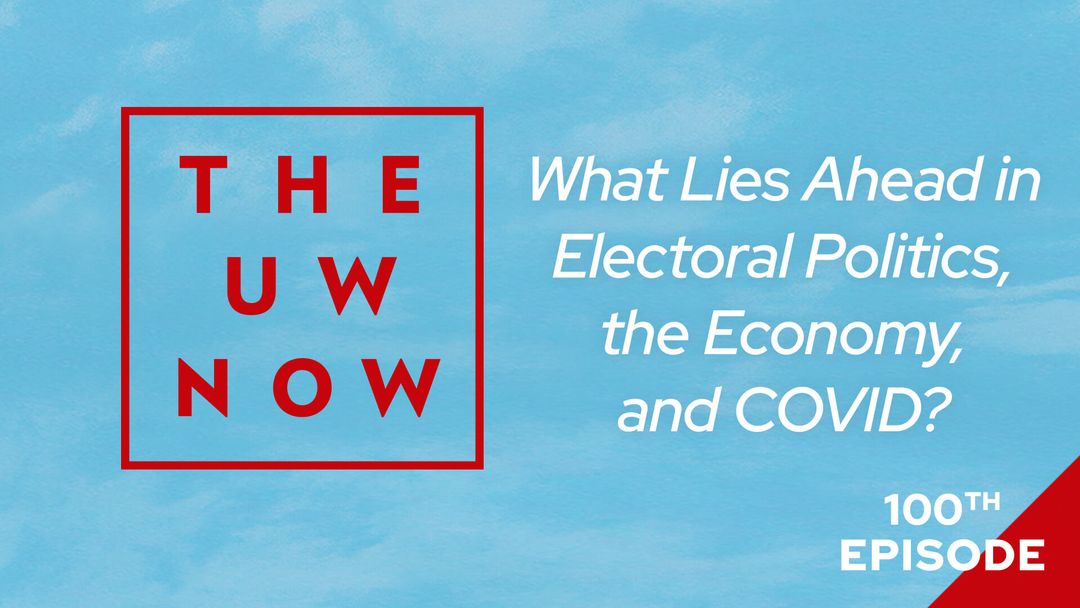“Everybody talks about the weather,” Mark Twain said, “but nobody does anything about it.” And though he wasn’t referring to Steve Ackerman, he might as well have been — Ackerman talks about the weather more than most people. He’s not only a professor emeritus of atmospheric and oceanic sciences; he also partners with Professor Jon Martin as the “Weather Guys,” answering weather-related questions on public radio and penning a weekly column in Madison’s Wisconsin State Journal.
Before becoming a faculty member — and later UW–Madison’s vice chancellor for research — Ackerman came to the university in 1987 as a scientist at the UW’s Cooperative Institute for Meteorological Satellite Studies. “A good way to study global weather is to use data collected by weather satellites,” he says. “And since the University of Wisconsin is considered the birthplace of weather satellites, this seemed a great place to conduct research on weather and climate.”
Ackerman retired in 2023, but he continues to read up on meteorological research, and he continues with work as a Weather Guy. On July 16, 2024, The UW Now Livestream will also talk about the weather, as the Weather Guys explain the data and show how we know that the climate is warming — and where we see the effects of that warming.
My Main Area of Research Was:
Much of my research centered on studying weather and climate from satellites. That led to many research grants from NASA and NOAA [the National Oceanic and Atmospheric Administration]. New satellite instruments and platforms were being developed to study Earth. And one of the first things to know when looking down on Earth from a satellite is the answer to the question, “Is the scene being viewed cloudy?” It doesn’t matter if you are using the satellite measurements to study the atmosphere, the ground, the water, or the clouds themselves, you must know if the scene is cloudy. Different research teams were using the same satellite observations to do their work, and what I wanted, and NASA agreed, was to have one analysis procedure that would tell you if the observation was cloudy or cloud free. And I ended up leading the team that developed that procedure.
Tonight on The UW Now Livestream, I’ll Discuss:
Severe or extreme weather can be caused or intensified by climate change, but other factors play a role, too. The ingredients that create all weather events remain the same, but a changing climate can affect one or more of those ingredients, so that it occurs more often or less often — or more intensely or less intensely. The science of extreme-event attribution has advanced rapidly in recent years. Scientific confidence is strongest when the extreme events occur through a well-understood physical mechanism — for example, the more frequent heat waves that are closely connected to human-caused global temperature increases.Observations, and the physics, indicate a global warming is occurring. Observations show that new daily high and low temperature records are being set. Heat waves are periods of unusually hot weather — outside the historical averages for a particular location — typically lasting for two or more days. Heat waves have happened in the past, but climate change is making heat waves longer, more extreme, and more frequent. Sometimes prolonged heat waves are made more likely by a warmer world. And sometimes, they are driven by natural climate variability. Sorting this out takes time and careful research to identify patterns of climate change influencing specific weather events.
The Main Thing I Want Viewers to Remember Is:
Atmospheric science, which includes weather and climate observations and forecasts, is a science. As such it’s a systematic discipline that builds and organizes knowledge in the form of testable hypotheses and predictions. When you hear someone say global warming isn’t real, or the weather forecast is bad, think about what is that comment based on. Does the individual have data to demonstrate that statement? Or is there a testable hypothesis that can prove or not prove that statement?
To Get Smart Fast, See:
Jon Martin and I have a weekly column in the Madison paper, as well as being guests on Larry Mieller’s Wisconsin Public Radio call-in show, so people can reach out to us with their questions.
- For phones, the radar app I use often is called RadarScope.
- For forecasts, the Weather Underground and National Weather Service are good resources.
- For climate, I use the National Oceanic and Atmospheric Administration (NOAA) site.
